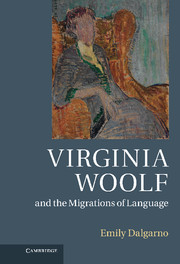Book contents
- Frontmatter
- Contents
- Preface
- Abbreviations
- The migrations of language: introduction
- Chapter 1 Translation and ethnography in “On Not Knowing Greek”
- Chapter 2 Antigone and the public language
- Chapter 3 Tolstoy, Dostoyevsky, and the Russian soul
- Chapter 4 Proust and the fictions of the unconscious
- Chapter 5 Translation and iterability
- Chapter 6 Assia Djebar and the poetics of lamentation
- Conclusion
- Bibliography of works cited
- Index
- References
Chapter 2 - Antigone and the public language
Published online by Cambridge University Press: 07 October 2011
- Frontmatter
- Contents
- Preface
- Abbreviations
- The migrations of language: introduction
- Chapter 1 Translation and ethnography in “On Not Knowing Greek”
- Chapter 2 Antigone and the public language
- Chapter 3 Tolstoy, Dostoyevsky, and the Russian soul
- Chapter 4 Proust and the fictions of the unconscious
- Chapter 5 Translation and iterability
- Chapter 6 Assia Djebar and the poetics of lamentation
- Conclusion
- Bibliography of works cited
- Index
- References
Summary
Is there no guidance nowadays for a reader who yields to none in reverence for the dead, but is tormented by the suspicion that reverence for the dead is vitally connected with understanding the living?
Virginia Woolf, “How It Strikes a Contemporary” (1923), The Common ReaderVirginia Woolf’s analysis of the links between patriarchy and Fascism has been the focus of most studies of Three Guineas, but another aspect of German culture that is focused on the politics of translation shows how her Antigone writes history by challenging the vocabulary of public discourse. I read Woolf’s figure of Antigone in the context of European classical studies which sought to connect ancient Greek thought to events in twentieth-century history. The grand scale of the problem is indicated by the number of philosophers, poets, and classicists in Germany and France whose study led them to new readings of Sophocles. George Steiner offers a broad analytical survey from Hegel and Hölderlin to Benjamin and Sartre. Miriam Leonard has studied the role of classical scholars in the political upheavals in France since 1945, when scholars “used classical figures to explore the nature of the citizen/subject in relation to politics and ethics.” Whereas translation in “On Not Knowing Greek” is a way of coming to terms with mourning “the vast catastrophe of the European war,” the translation of Antigone read in the context of contemporary European interpretations motivates the reader to rewrite history from the perspective of that mourning.
Woolf’s Antigone is the figure who interrogates the European institution of dictatorship not only by the force of her will and character but by her insistence on taking the fight to language. To abstract her from the play and from the centuries of its interpretation results in moralizing her figure in order to mirror the twentieth-century reader’s expectations that she become the girl who sacrificed her life to defy a dictator. The humanist reading takes for granted that Antigone is a female figure. To do so, argues Olga Taxidou, is to “take the discursive construct of the human/female Antigone as a finished product that then stands in for their interpreted Antigone,” a process that is based on the assumption of “the separability of watching/reading and doing” as well as on an “empathic reading of character.” By overlooking the conditions of performance a humanist reading of the play fails to grasp the centrality of a politicized mourning, or the challenge to the assumption of a “reconstructed line of hermeneutics from the Greeks straight to the twentieth century.”
- Type
- Chapter
- Information
- Virginia Woolf and the Migrations of Language , pp. 38 - 68Publisher: Cambridge University PressPrint publication year: 2011

